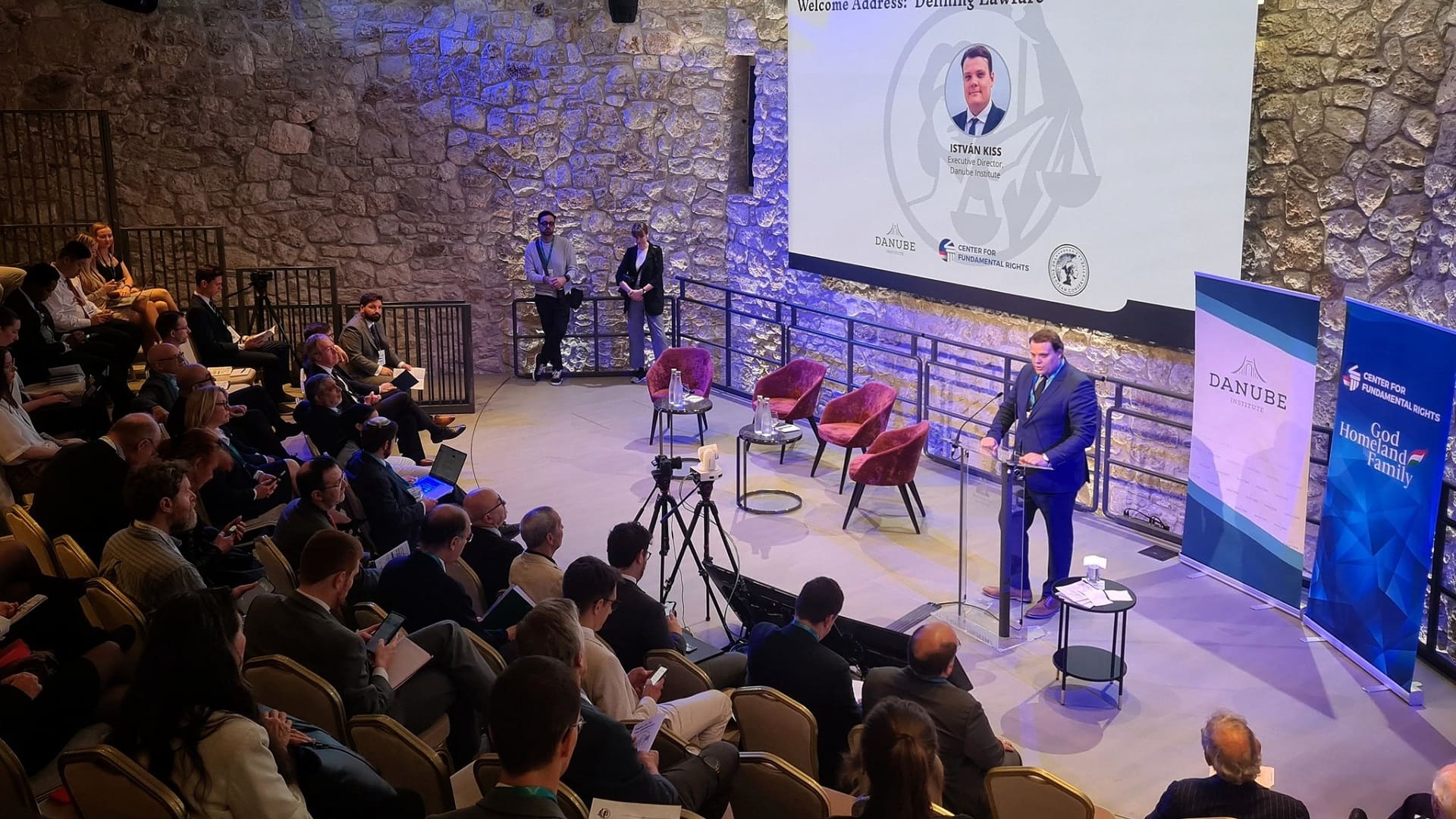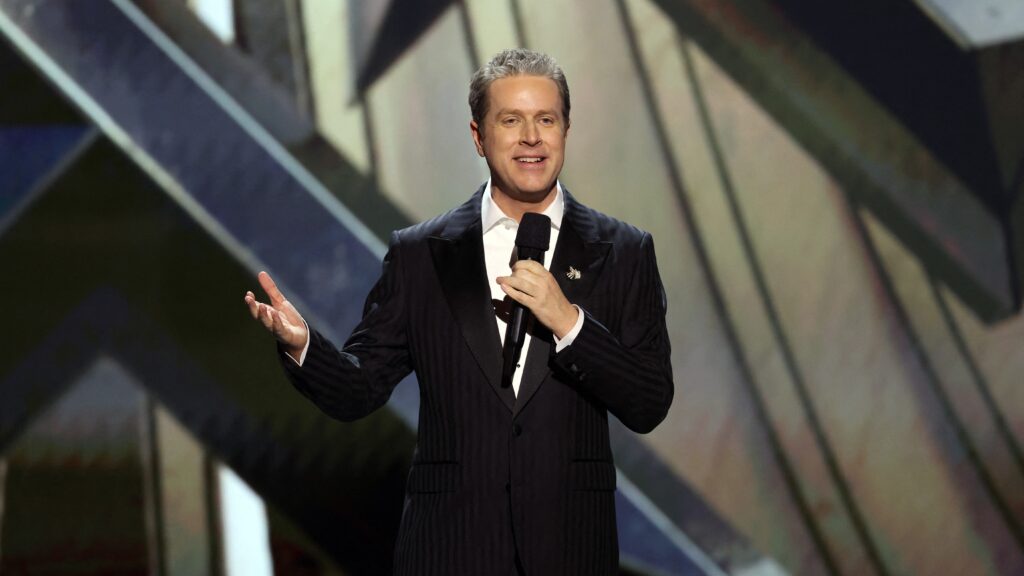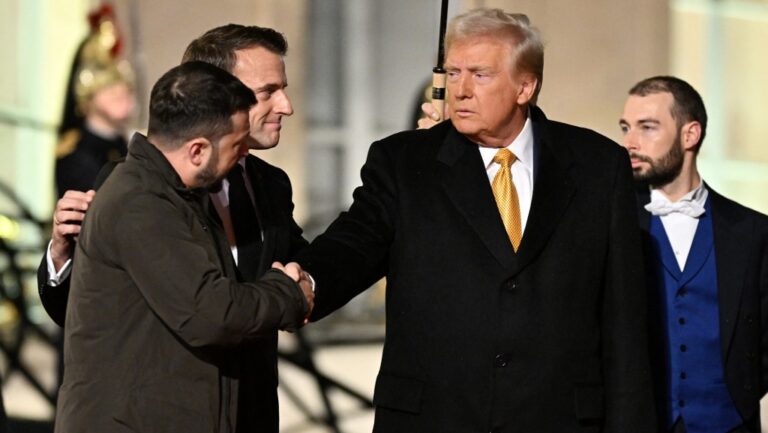The Danube Institute is hosting a two-day conference dedicated to the elusive but ever-so-debated concept of rule of law. The event titled Rule of Law as Lawfare Conference is taking place 27–28 May at the scenic Castle District of Budapest, Hungary.
The two-day event started with a series of keynote speeches by illustrious speakers. István Kiss, executive director of the hosting Danube Institute was the first to take the stage. He talked about the memory of his old perception he held in post-communist Hungary in the early 1990s, when he regarded the rule of law as a ‘sacred cow,’ an ideal for all democracies. However, as time went by, he found himself disappointed by some self-proclaimed champions of the rule of law. Since Mr Kiss grew up in the United Kingdom, his first such experience was Prime Minister Tony Blair’s attempts at constitutional reforms. Later, he had similar feelings when the US Supreme Court ruled that same-sex marriage is legal by default in all 50 states in their Obergefell v. Hodges ruling in 2015. The Supreme Court did so despite the fact that a referendum banning gay marriage passed even in the liberal stronghold state of California in 2008. Mr Kiss has seen similar power grabs by courts in places like Israel, Spain, and Poland.
István Kovács, the strategic director for the Center for Fundamental Rights was the first to give a definition of ‘rule of law’. He professed it means ‘all people are subject to the same treatment under laws created by a legitimate body’. Alvino-Mario Fantini, the Editor-in-Chief of The European Conservative magazine pointed out that in Spanish, the concept is called ‘Imperio de la ley,’ meaning ‘empire of law,’ which, he believes, is a very anthropocentric concept with deep philosophical underpinnings.
Minister of European Union Affairs János Bóka also graced the stage for a short speech. He pointed out that, simultaneously with this event, there is a ‘Rule of Law Clinic’ event ongoing also in Budapest, put on by the radical leftist Democracy Institute, an organization part of the Central European University. Minister Bóka expressed his gratitude that both of these event can take place in Budapest, with neither having to feat being shut down by police, in reference to what happened at the National Conservatism Conference in Brussels, Belgium in April 2024.
He went on to describe how the rule of law is different as a political concept than as a legal concept.
He stated the executive bodies of the European Union are clearly using it as a political tool, given that ‘rule of law’ is not defined anywhere in the EU treaties. However, Article 7 of the Treaty of the European Union does outline two ‘purely political’ procedures in case serious rule of law breaches are committed by a Member State, a preventive one and a punitive one.
Minister Bóka concurred that such procedures could have a legitimate place in EU institutions, if the legal concepts were better defined in the treaties and the standards were to be applied equally to all states. However, he used the metaphor of ‘playing chess with a pigeon’ when describing dealing with the European Commission about the rule of law mechanism currently ongoing against Hungary. As the speaker put it:
‘When you’re playing [chess] with a pigeon, it will also move the pieces on the board, sometimes even according to the rules. It very rarely wins, but it couldn’t care less. It obviously has a good time, and keeps you occupied for a while. At some point, the pigeon decides it has enough and flies away. You might think this is because you won the game. But don’t forget that the pigeon doesn’t know anything about chess. So how could it know whether it is winning or losing?’
The first panel discussion featured Eugene Kontorovich, professor at the George Mason University Scalia Law School; Polish MEP Ryszard Legutko, Co-chairman of the Conservatives and Reformists; and Steve Hayward, Senior Fellow at the UC Berkeley Law School.
x.com
No Description
Professor Kontorovich criticized the EU’s rule of procedures for being highly subjective and anumerical, even compared to the world democracy rankings of the World Bank and the Freedom House. He also lauded the Hungarian government for dismissing the International Criminal Court’s arrest warrant against Prime Minister Benjamin Netanyahu of Israel as having ‘no basis in legality,’ even when Germany was unwilling to dismiss it as such. MEP Legutko pointed out the left’s tendency to ‘corrupt the language’ and hijack the meanings of words such as ‘democracy,’ ‘diversity,’ and ‘rule of law’. He also expressed his doubts that there would be a monumental shift to the right in EU institutions after the EP elections on 9 June, as such a change is ‘a long process’. Mr Hayward talked of ‘progressive revolutions’ taking place in the West in the past decades, which got to the point where some far-left activists are openly stating that they think national sovereignty and borders are obsolete. He also expressed that he felt ‘shocked’ when he saw the pro-Palestinian protests at American college campuses, to which Professor Kontorovich responded that he still loves free speech, and ‘at least now we know what they think’.
Jerzy Kwaśniewski, President of the Board and co-founder of Ordo Iuris Institute; Ricardo Ruiz de la Serna, Associate Lecturer, San Pablo-CEU University; and Miklós Szánthó, Director General, Center for Fundamental Rights took the stage next to have a discussion about the double and even triple standards EU bodies exhibited in dealing with Hungary, Poland, and Spain. This discussion was moderated by Gergely Dobozi, senior research fellow at the Danube Institute and the editor-in-chief of this very website, who prefaced the panel with a short speech.
In it, Mr Dobozi talked about the Hungarian term for the rule of law, ‘jogállamiság,’ the two main aspects of which are law and statehood in his definition. These ideas are also enshrined in the Fundamental Law of Hungary, which allows for the country to have international cooperation with other nations. However,
one of the most important cooperative unions, the EU, uses the concept of rule of law for ‘thinly veiled political attacks’.
In December 2020, as the speaker pointed out, they took their attack to the next level when the European Commission decided to withhold billions of euros in COVID recovery and cohesion funds from Hungary as part of a rule law mechanism.
Mr Szánthó started this panel discussion with a strong statement, saying it is ‘useless to talk about the rule of law’ while the European Union is seriously considering the accession of Ukraine, a war-torn country that cannot even perform its own executive functions to 100 per cent currently. He also pointed out the peculiarity of how quickly the rule of law assessment procedure stopped against Poland as soon as a leftist government came into power.
Mr Kwaśniewsk outlined the severe political norm rule of law breaches the new Tusk administration committed since taking office. These include the defending of public media, which led to the national TV station stopping broadcast for the first time since the 1981 Polish uprising against Soviet rule, the unconstitutional takeover of the National Prosecutors Office, the purge of about 2,500 judges appointed by President Andrzej Duda, and the political prosecution of many members of the opposition PiS party. He also pointed out that the EU Commission decided to suspend the rule of law mechanism against Poland before any new legislation was passed by the new parliament.
Mr de la Serna also listed a whole host of grievances committed by the left-wing government in his home country, Spain. The socialist government led by Prime Minister Pedro Sánchez took over the Constitutional Court by nominating his former attorney general to preside over it, violated the ideal of equality before the law by creating special protected minority groups, and gave clemency to people involved in the 2017 Catalan coup attempt for political benefit. These acts are also tacitly condoned by the European Commission, as no punitive measures have been taken against the Sánchez administration.
Related articles:







